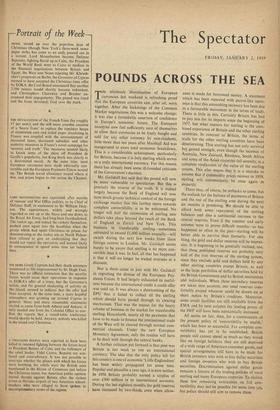POUNDS ACROSS THE SEA
THE wholesale liberalisation of European currencies last weekend is refreshing proof that the European countries ean,,after all, work together. After the bickerings of the Common Market negotiations this was a welcome change; it was also a formidable assertion of confidence in Europe's economic future. The European countries now feel sufficiently sure of themselves to allow their currencies to be freely bought and sold for any other currency by non-residents, little more than ten years after Marshall Aid was inaugurated to avert total economic breakdown. This is a considerable achievement, particularly for Britain, because it is Only sterling which serves as a truly international currency. For this reason there has already been some ill-founded criticism of the Government's decision.
Mr. Gaitskell has said that the pound will now be more vulnerable to speculation. But this is precisely the reverse of the' truth. It is indeed largely because the Bank of England will now have much greater technical control of the foreign exchange market that this further move towards complete convertibility is to be welcomed. No longer will half the conversion of sterling into dollars take place beyond the reach of the Bank of England in Zurich and New York. This business in 'transferable sterling—sometimes estimated to exceed £1,000 million annually—will switch during the next few weeks from these foreign centres to London. Mr. Gaitskell seems barely to be aware that sterling is no more con- vertible than it was. In fact, all that has happened is that it will no longer be traded overseas at a discount.
Nor is there cause to join with Mr. Gaitskell in regretting the demise of the European Pay- ments Union. It had largely exhausted its useful- ness because the international credit it could offer was used up. It was always a shortcoming of the EPU that it failed to collect all the sterling which should have passed through its clearing. mechanism. That was the reason for the heavy volume of business in the market for transferable sterling. Henceforth, nearly all the payments that have to be made to finance the international trade of the West will be cleared through normal com- mercial channels. Under the new European Monetary Agreement, only the residue will have to be dealt with through the central banks.
A further criticism put forward is that post-war Britain is too weak to run an international currency. The idea that the only policy left for this country is one of economic 'Little Englandism' has been widely propagated for some time.
Popular and plausible a year ago, it is now neither.
In 1958 Britain probably earned a surplus of over £500 million in its international accounts.
During the last eighteen months the gold reserves have increased by two-thirds, even when allow- ance is made for borrowed money. A statement which has been repeated with parrot-like insist- ence is that this astonishing recovery has been due to a favourable movement in the terms of trade. There is little in this. Certainly Britain has had to pay less for its imports since the beginning of 1957, but what matters for sterling is the com- bined experience of Britain and the other sterling countries. In contrast to' Britain, the terms of trade for the other sterling countries have been deteriorating. That sterling has not only survived but gained strength, even though the incomes of Australia, New Zealand, Rhodesia, South Africa and some of the-Asian countries fell severely, is a complete vindication of the value of the sterling system. This also means that it is a mistake to assume that if commodity prices recover in 1959, sterling will automatically be once again in jeopardy.
There may, of course, be setbacks to come, but the outlook for the balance of payments of Britain and the rest of the sterling area during the next six months is promising. We should be able to afford both some repayment of the sterling balances and also a substantial increase in the central reserves. Even if the summer and early autumn were to prove difficult months—as has happened so often in the past—sterling will be better able to survive than formerly. For one thing, the gold and dollar reserves will be impres- sive. It is beginning to be generally realised, too, that these published reserves are probably only half of the true reserves of the sterling system, since they exclude gold and dollars held by any other sterling countries except Britain, as well as the large portfolios of dollar securities held by the British Government and by British institutions and individuals. When these secondary reserves are taken into account, our total reserves com- fortably exceed whatever could be drawn on at short notice by Britain's creditors. Moreover, some credit facilities are still available from the EMA and by next autumn the lending power of the IMF will have been substantially increased.
All seems set fair, then, for a continuation of the present policy of 'convertibility by stealth,' which has been so successful. For complete con- vertibility has yet to be established. British people still cannot spend as much as they would like on foreign holidays, they are still deprived of a wide range of American consumer goods, and special arrangements still have to be made for British investors who wish to buy dollar securities and foreign investors who wish to buy British securities. Discrimination against dollar goods remains a feature of the trading policies of most sterling and Many European countries. To abolish these few remaining restrictions on full con- vertibility may not be possible for some time yet, but policy should still aim to remove them.










































 Previous page
Previous page